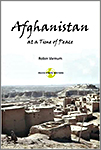Review — AFGHANISTAN AT A TIME OF PEACE by Robin Varnum
 Afghanistan at a Time of Peace
Afghanistan at a Time of Peace
by Robin Varnum (Afghanistan 1971–73)
Peace Corps Writers
June, 2021
201 pages
$25.00 (paperback), $10.00 (Kindle)
Reviewed by Will Irwin (Afghanistan 1966–67)
•
Robin Varnum tells the story of serving as a PCV in Ghazni, Afghanistan in 1972–73 with her husband Mark and another PCV, Juri Zagarins, fluidly and with engaging detail, from beginning to end. Afghanistan at a Time of Peace (Peace Corps Writers, 2021) is a nicely-designed volume, liberally illustrated with color photos taken by Juri when she was in her early 20s and newly married.
Robin tells her story chronologically, from the invitation she and Mark received to go to Afghanistan in December 1971 as TEFLers through training, their assignment to teach in Ghazni, and the quotidian and unusual experiences they had living and teaching there until their departure in December 1973. A sampling of each:
- Bouts with amoebic dysentery for all three, cured with Diodoquin and tetracycline;
- A backfired attempt to teach her girls English vocabulary by showing them U.S. fashion magazines. But the girls were more interested in the Maidenform bra ads. Why don’t you wear a bra, Malem-Sahib? Robin assured them she did.
- Mark and Juri are invited to a madrasa where they sat with 2,000 worshippers for four hours, are then treated to lunch with the senior clergy at a table set with knives and forks instead of on the floor, Afghan style. The head mullah was clearly impressed by the Apollo moon landings. Mohammad had prophesied that man would fly to the moon, he said.
- Robin and Mark smoke hashish, discreetly, after climbing down from the large Buddha’s head in Bamiyan;
- A special tour by an archeologist who was working at Tapa Sardar, a thriving Buddhist center in the sixth and seventh centuries in Ghazni, where Afghanistan’s third largest Buddha had been excavated in early summer 1972. It was also later destroyed by the Taliban;
- Dealing with allegations that Peace Corps was a front for the C.I.A.;
- Dealing with cheating on exams by students and bribes by their parents to give them passing grade.
- The July 17, 1973, coup d’etat in which Mohammad Daoud ousted Zahir Shah;
- A visit to Ghazni by Peace Corps Afghanistan Country Director John Guyer and his wife Diana with her brother, Senator Charles Percy.
- Parting with their pet Afghan hound, Asia, before leaving the country.
- Culture shock upon returning to the U.S. “Americans in general seemed harried and self-absorbed.” After a week visiting Mark’s parents, his father asked: “Can’t you talk about anything other than Afghanistan?” It pained Robin that the conclusion her mother had drawn from her letters home was that the experience had been “an exercise in frustration.”
In an afterword she relates the break-up of their marriage not long after returning to the U.S. and enrolling in grad school, and her marriage to Juri two years later. She and Juri taught in Springfield, Massachusetts for many years, Juri at the Springfield Technical Community College, Robin at the American International College, chairing its English department from 2005 to 2016.
She also briefly reviews the political developments in the country in the years after she left and the fates of their American and Afghan friends, to the extent she knows. Two of them she knows, were killed or disappeared during the 1978 Saur revolution.
Of course, Robin described her Peace Corps experience as “transformational.” It affected Robin and Juri’s “career choices and our decisions about where to live, where to send our kids to school, what church to attend, what causes to embrace, and how to vote.”
As with many — if not most — PCVs who served in Afghanistan, Robin fell in love with the country and its people. And, as with many, that attachment to the country and the concern for its people, especially in view of its present uncertain future, has continued until today, as is evident in her preface and afterword.
There is also a bibliography and a glossary. Baksheesh and charpayi are familiar Dari, but you’ll probably have to get the book to learn the meaning of jig-jig lozim-[ast?].
And, for the required flaw in the work showing that only Allah is perfect, Robin refers to Juri discussing Thomas Mann’s Das Zauberberg (The Magic Mountain) with a friend. It is Der Zauberberg.
•
Reviewer Will Irwin served as a member of Group VIII in 1966 t0 1967 at the Kabul Times where he met Fran Hopkins of Group IV, his wife of 53 years. He made his career as an appeals judge in the U.S. Department of the Interior until he retired in 2006. He currently serves as the president of the Growing Peace in Afghanistan Fund, a 501(c)(3) organization dedicated to assisting women weavers in Bamiyan province. See BamiyanWeavers.org.
No comments yet.
Add your comment